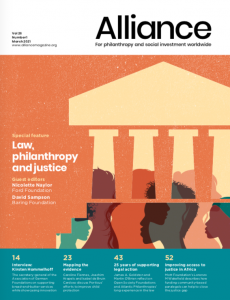Although charities have a proud history of catalysing much-needed social change, there is mounting concern that governments might be using newly-minted charities law frameworks as a mechanism to ‘crack down’ on the legitimate activities of charities.
Along with a wave of trust law reform, a wave of charities law reform has been taking place around the world, including in Australia, China, the U.K., Ireland, Jamaica, Jersey, New Zealand, Northern Ireland, Pakistan, Uganda, and Zambia. But issues are already arising with governments around the world using such laws to censor or exercise undue control over civil society in countries as widespread as Australia, China, the U.K., Uganda, New Zealand, India, and Mexico.
Must charities be relegated to underfunded service delivery arms of governments, unheard and largely unseen? Must charities be restricted to waiting until people have fallen off a cliff before being able to help them?
One of the best things we could do, as a species, to maximise our chances of being able to build back better in response to Covid-19, if not to preserve our very ability to exist on the planet in the face of catastrophic climate change, is to get the legal framework for charities right.
‘Charity’ need not be confined to old-fashioned, paternalistic, colonial, deficits-based concepts of handouts to the poor. Correctly interpreted, the concept of charity is wide, sophisticated and nuanced, and perfectly capable of serving us well over time. Communities know best what communities need. The charitable sector is an important builder of social capital, a ‘glue’ that holds societies together, and can be a key incubator of innovative solutions to intractable problems.
Charities can also reach into areas that governments cannot, and we have seen first-hand how important social capital is in responding to issues such as Covid-19. History tells us that the freedoms of democracy are hard won, and easily lost. Can we push back against increasing authoritarianism? How can we best preserve the unique, innovative, grassroots, democracy-building magic that the charitable sector is capable of providing? In principle, and while respectful of jurisdictional idiosyncrasies, what principles would best guide a philosophy of ‘regulation’ in this area? What processes can we put in place to help find an optimum balance while protecting against ‘throwing the baby out with the bathwater’?
The 2019 New Zealand Law Foundation International Research Fellowship Te Karahipi Rangahau ā Taiao is dedicated to the research topic ‘What does a world-leading framework of charities law look like?’, with a report due by September 2021. More information about the research can be found at http://www.charitieslawreform.nz. If you have insights in this area, please get in touch: we would love to consult with you.
Sue Barker is the Director of Sue Barker Charities Law in Wellington, New Zealand.
Upcoming issue: Law, philanthropy and justice
 Legal action has a significant contribution to make to achieving social change and covers a huge range of fundable activities. These include widening access to justice, supporting public legal education, investing in the next generation of activist lawyers and helping human rights defenders and climate activists. Yet only a small part of organised philanthropy has a specific strategy for legal action and many funders are cautious about working in this area. This issue will explore new ways for funders to reimagine justice and debate effective strategies for contemporary philanthropic engagement in and with the law. Guest edited by Nicolette Naylor, Director of the Southern Africa office of the Ford Foundation and David Sampson, Deputy Director, Baring Foundation, UK.
Legal action has a significant contribution to make to achieving social change and covers a huge range of fundable activities. These include widening access to justice, supporting public legal education, investing in the next generation of activist lawyers and helping human rights defenders and climate activists. Yet only a small part of organised philanthropy has a specific strategy for legal action and many funders are cautious about working in this area. This issue will explore new ways for funders to reimagine justice and debate effective strategies for contemporary philanthropic engagement in and with the law. Guest edited by Nicolette Naylor, Director of the Southern Africa office of the Ford Foundation and David Sampson, Deputy Director, Baring Foundation, UK.
Subscribe today to make sure not to miss it!



Comments (1)
Thank you for an additional good article. Exactly where else could anybody get this type of detail in such a perfect way of writing. Thanks for sharing.